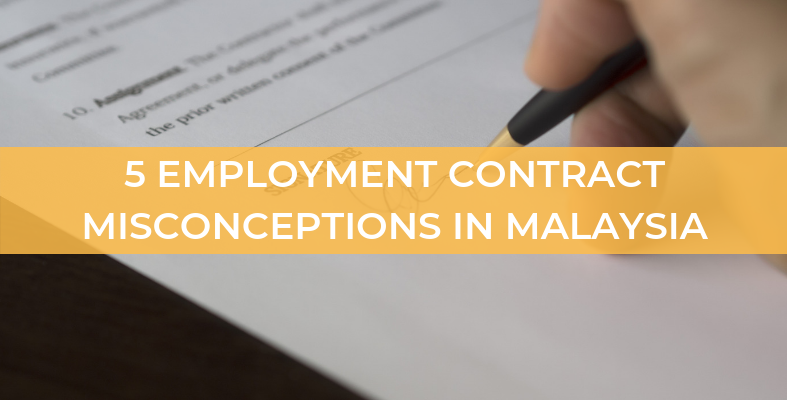
5 Misconceptions About Employment Contract in Malaysia
Create Job Description Using AI
Write appealing job descriptions for any job opening to attract the most qualifield and suitable candidates. FOR FREE.
try now
It does not matter if you're an employer or an employee, understanding how an employment contract works is very important. In HR, we have encountered so many situations where after an employment contract is signed, it will be locked away in a cabinet and abandoned until a problem occurs. When that time comes, both parties will realise that it's too late and they did not truly understand their contractual commitments.
This article will clarify some of the misconceptions in an employment contract.
Probation Period
“Your employment is subject to a probationary period of 6 months.”
Misconception: If the employer does not say anything and continues to employ the employee after the probationary period, then the employee is seen as a confirmed staff.
Reality: There's no such thing as "automatic confirmation" in Malaysian law. Until the employee receives a confirmation letter, they will continue to remain a probationer. Though there are some exceptions, such as where there is enough evidence that the employer had treated the employee as a confirmed staff.
Read : HR Guide: Probation Extension Tips with Templates
Notice Period
“Either party may terminate this agreement by providing 1 month’s notice in writing, or payment of 1 month’s salary in lieu of notice.”
Misconception: The employer can fire their employee for any reason so long as they provide them with notice, or make payment in lieu of notice.
Reality: You cannot just fire someone for no reason. Malaysian law states that employers can only fire employees for "just cause and excuse". They will need to prepare a "good" reason for termination. For example, poor performance, redundancy or misconduct. If not, the employee can claim for unfair dismissal. Mere compliance with the notice period is not enough. But, do note that employees do not need to present any reasons for resigning.

Misconception: The employer can set any notice period that they prefer so long as they put it in writing. Therefore, they can require their employee to give them 3 month’s notice of resignation while they only need to give their employee 1 month’s notice of termination.
Reality: This is partially true for some employees. Employees whose monthly wage does not exceed RM2,000 and/or are participating in manual labour are subject to the Employment Act 1955. For these employees, the length of a notice shall be the same for both employer and employee. Moreover, termination of an employee on particular reasons (eg: closure of business) is subject to minimum notice requirements under the Employment Act, which is dependent on the EA Employee’s length of service.
Non-Competition Clause
“The Employee agrees that he shall not, for a period of 6 months after the cessation of his employment with the Company, be employed by, engaged, interested or associated with any trade or business which is wholly or partly in competition with the Company.”
Misconception: The employer invested a lot of time and money in their employee. The employee is also dealing with highly sensitive and confidential information. As such, the employer has a right to prevent the employee from joining a competitor after they resign.
Reality: Non-compete clauses (which takes effect after the end of employment) are clauses in restraint of trade, which are void following Section 28 of the Contracts Act 1950. Employers who seek to protect their confidential information, trade secrets, and employees, should consider other alternatives such as non-disclosure agreements, and anti-solicitation clauses.
Statutory Contributions
“The Company will contribute to EPF at the prevailing statutory rates.”
Misconception: The employer can make their employee’s salary package “inclusive” of all EPF contributions (including the employer’s contribution), as long as they agree to it. This way, the salary package looks bigger and more attractive to potential employees.
Reality: The Employees Provident Fund Act 1991 (“EPF Act”) forbids employers from deducting or otherwise recovering the employer’s contribution from the employee, notwithstanding any contract to the contrary. A poorly drafted compensation package could result in misunderstandings that could also violate the EPF Act. For transparency, it may be better for compensation packages to be communicated exclusively of any employer contribution to statutory funds.
Company Transfer
“The Company has a right to transfer you to any department, station, office, branch, subsidiary or associate of the Company.”
Misconception: Employers can transfer employees anywhere and for any reason, so long as they have this clause in the contract.
Reality: While the law recognises the managerial right of employers to reorganise and transfer their workforce in order to achieve business goals, these transfers must be done in good faith and not victimise an employee. Additionally, a transfer cannot involve a material change or affect the employee’s terms and conditions of employment. If noot, there will be a risk that the employee could claim for constructive dismissal.
Are You Short on Staff? Reach millions of job seekers on Maukerja, Ricebowl, LinkedIn, Jora, Trovit, and more when you post a job on AJobThing.com Register today!
Related articles
Can an Employer Reject a Sick Leave
